
Return To Veterans Accounts Index
Reasons For Success Of War In Burma
by
Col. John Hill
Army Service No.77668
.....The
late Col. John Hill, C.O. of B Company 2nd Bn. retuned to pay homage and
reflect on the actions he and many men like him achieved. Come you back,
you British soldier; come you back to Mandalay!
.....During the period 4-18 April 1995, 50
years after the Burma War Col. John Hill returned with a BBC film crew,
their aim - to make a documentary to commemorate VJ-Day.
.....In Hill's own words; "I was able
to visit 28 of my B Company Royal Berkshire graves including that of CSM
RH Staples killed at Kin-u, our company runner, Pte
P Ravenscroft killed at Mandalay and Sgt
ARC Heywood, died of wounds Mandalay, who had already won the Distinguished
Conduct Medal as a platoon commander for superlative leadership qualities
in the long advance to the city. Lt
J Ridley, our first platoon commander to be killed in December 1944.
Pte F Lea, a valiant light
machine gunner killed on the last day of the three-week battle for Kabwet
and CQMSC Freed who met
his end when a bale of hay dropped by air hit him and Pte
C Helyer, his driver at the edge of a dropping zone at the Irrawaddy
River crossing. On the colonnades I found LCpl
W Dale."
.....What was not disclosed during the filming
was Col. Hill's reasoning's for the battalion's outstanding success against
such a hostile environment and equally hostile foe, which was discovered
by his Daughter Mrs. Monica Butt; "It was scribbled on a piece of
paper and took a bit of deciphering!" Which Mrs. Butt kindly donated:-
REASONS FOR SUCCESS OF WAR IN BURMA
1. Two solid years
of training, particularly Officer Training and Battle School Indoctrinates.
We trained for jungle, desert, mountain, amphibian, learning to cross
rivers of all types, night fighting, navigation by stars, etc. Morale
was at its high going to war for the first time. Divisional spirit - a
knowledge of the high standards of the Indians and Gurkhas.
2. The routines of discipline - care of arms and
feet, footpowder, anti mosquito, water, sterilising. No fear of the jungle,
toughness. The Jungle - knowing the noises of nature, understanding the
limitation of movement and noise of voices - smell of Japs - footprints
in the paths.
3. Jungle-noises needed to be understood, bamboo
rustling, animal or man? Unique communications by mouth whistle for each
platoon. Carrying razor blades to cut ticks/leeches - use of salt to withdraw
heads.
4. Maps - vital for distance, features/ compass,
protractor, pencil, torch - knowledge of stars in the southern sky south
of Capricorn Tropic -Orion, Sirius, Betelgeux, Southern Cross, circling
the sky, established the north points for orientation.
5. Japanese methods and atrocities and ant like persistence
in obeying orders to die for the Emperor - no surrender, all known.
A totally different culture and breed from us. Total dedication to killing
every Jap, Swords, human remains in their packs. It is either them or
us. It had to be them.
6. Company reputation for success. A good team of well-motivated
men working together led by well trained NCO. Knowing what had to be done
at individual/section level. People excelled - miners at digging,
field craft - farmers at rough/tough attitude to life and cockneys/townsmen
at using their wits.
7. All our men performed well. Invidious to single out
individuals - chance was everything in standing out from the crowd.
The NCO: junior leaders - bore the brunt in alertness, ability
and discipline, physical fitness.
8. General Slim - dour, unsmiling, thinking about his
great problem, beating the enemy without catastrophic losses to us. General
Rees - dynamic, cheerful, tough. His enthusiasm nearly cost him his life
- often. He became a nuisance to our C.O. leading from the front.
9. Mandalay was the first we saw of ‘civilisation’
in 150 miles of our advance - tails up. The Hill looked formidable and
we knew it was held but it was just another long battle we thought, our
morale was high.
10. The Hill with its long line of gold top pagodas,
the scrub and ruined houses in Mandalay from bombing. The Fort walls to
our East, the Clock Tower 400 yards from the West Gate, the Railway engine
yards, the RC Church. The extremes of dark nights with some moon. The
difficulties of seeing the enemy - making sure he was the enemy. Password:
Recognition whistle in sotto voce, creeping about by night only in emergency
- thus anyone moving is a Jap!
Regimental Tradition.
China Dragon cap badge, Tofrek 1885 - Maiwand 1880 - Bourlon Wood in WWI.
Made us aware we could not let the side down - our morale was buoyed up
by what our forefathers had done in similar battles long ago.
Col. L.J.L. Hill
2nd Battalion Royal Berkshire Regiment
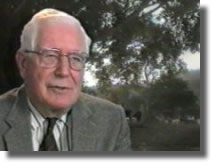
Col. John Hill In 1999
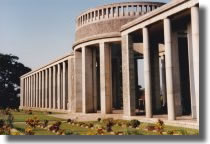
Taukkyan War Cemetery Rangoon
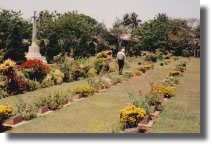
Rangoon Cemetery
John Hill Searching for Royal Berkshire Regiment Graves
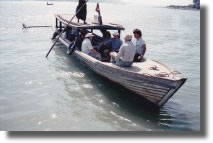
Footsteps
John Hill & BBC Team
Crossing The Irrawaddy River
At Kyaukmyaung
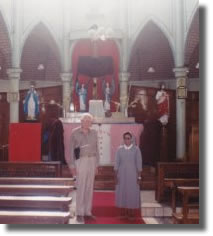
St. Mary's RC Church Mandalay.
Sister Mary Andrew With John Hill.
On Hearing We Had Captured A Japanese Medical Officer Praying At The Altar
In March 1945, Sister Mary Immediately Said Prayers!
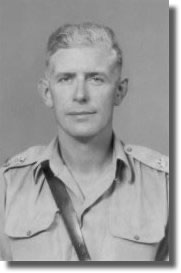
Col. Lionel John Lindsay Hill
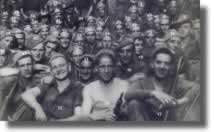
Ref No. 04
Some Of B Coy Before Crossing
The Chindwin River Nov 1944
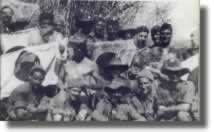
Ref No. 05
B Company After Their Engagement
At Kin-U Between The 6-8 January 1945
